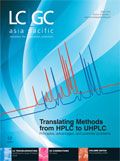Event: 31st International Symposium on MicroScale Bioseparations
31st International Symposium on MicroScale Bioseparations
The 31st International Symposium on MicroScale Bioseparations (MSB 2015) will be held from 26–29 April 2015 at the Crowne Plaza Hotel, Harbour City, Pudong, Shanghai, P.R. China. The symposium series was first established to support the field of high-performance capillary electrophoresis, but now covers all major microscale bioseparation techniques including capillary electrophoresis, nano-liquid chromatography, microfluidics, mass spectrometry, hyphenated detection methods, pharmaceutical analysis, biotechnology, clinical diagnostics, food and health, nanoparticles, and advanced detection and instrumentation.

Photo Credits: Blackstation/Getty Images
Around 70% of the planned programme will be built from submitted abstracts, where a blind peer review with an enhanced submission requirement has been developed to ensure a very high calibre of science being presented. A layer of confidentiality has been introduced to protect conversations and presentations to allow the discussion of unpublished work. The format of MSB 2015 has evolved to create a new biotechnology track with a focus on the practical applications of microscale separations. The presentation format has been adapted to create an extended discussion period with each paper, moderated by a session chair. The top three posters presented at the meeting will be selected for oral presentation in a special session as part of the finale of the symposium. Overall, it is the intent of this symposium to foster the exchange of ideas at the frontiers of separation science.
Four short courses are scheduled before the conference on 26 April, including "Immunoaffinity Capillary Electrophoresis for use in Biotechnology Applications" presented by Prof. Norberto Guzman from New Jersey, USA; "Multidimensional HPLC" presented by Dr. Gerard Rozing from Karlsruhe, Germany; and "Microfluidic Devices in the Life Science: Basics and Applications" presented by Prof. Jörg P. Butter from the University of Copenhagen, Denmark. More details are available from the website.
Current printer and laser technology has enabled a method termed print, cut, and laminate (PCL) fabrication that is capable of creating printable microfluidic devices in a simple, cost-effective, and rapid manner, using relatively commonplace office equipment. Professor James Landers will present a lecture discussing the theory and methodology associated with each of the steps, as well the material challenges associated with substrates and chemistries used in this method. This will be followed by a hands-on part of the workshop, where those involved will carry out PCL fabrication using the necessary materials and some standard microfluidic designs.
The historical city of Shanghai has been chosen for this meeting, which will provide excellent networking opportunities to perform scientific discussions. On the 28 April, the organizers have planned the MSB Gala Banquet that promises food, live music, and the opportunity to network. Registration for the event will be limited to 395 participants to establish a "smaller meeting" ambience with a focus on the vigorous scientific exchange between delegates.
E-mail: msb2015@msb2015.orgWebsite:msb2015.orgCo-Chairs: Yukui Zhang, Pengyuan Yang, Norman Dovichi, and Amy Y. Guo
15–17 April 2015Vietnam Analytica 2015
Saigon Exhibition & Convention Centre, Ho Chi Minh City, Vietnam
Contact: Eva Sauerborn
E-mail:eva.sauerborn@imag.deWebsite:www.analyticavietnam.com/en/Home
17–21 May 2015ISCC and GC×GC 2015
Hilton Fort Worth Hotel, Fort Worth, Texas, USA
Contact: Danielle Schug
E-mail:info@isccgcxgc2015.comWebsite:www.isccgcxgc2015.com
30 June–3 July 201521st International Symposium on Separation Sciences (ISSS 2015)
Grand Hotel Union, Ljubljiana, Slovenia
Tel: +38614760265
E-mail:info@isss2015.siWebsite:www.isss2015.si
22–24 July 20159th International Conference on Packed Column SFC
Loews Hotel, Philadelphia, USA
Tel: +1 412 805 6296
E-mail:register@greenchemistrygroup.orgWebsite:www.greenchemistrygroup.org/Registration.html
21–25 September 201543rd International Symposium on High-Performance Liquid Phase Separations and Related Techniques
Beijing International Convention Center Bejing, China
Contact: HPLC Secretariat
E-mail:info@hplc2015-beijing.orgWebsite:hplc2015-beijing.org/
3–6 November 2015Recent Advances in Food Analysis (RAFA)
Clarion Congress Hotel, Prague, Czech Republic
Tel: +386 1 4760265
E-mail:rafa2015@vscht.czWebsite:www.rafa2015.eu
Please send any event news to Bethany Degg bdegg@advanstar.com

Regulatory Deadlines and Supply Chain Challenges Take Center Stage in Nitrosamine Discussion
April 10th 2025During an LCGC International peer exchange, Aloka Srinivasan, Mayank Bhanti, and Amber Burch discussed the regulatory deadlines and supply chain challenges that come with nitrosamine analysis.









